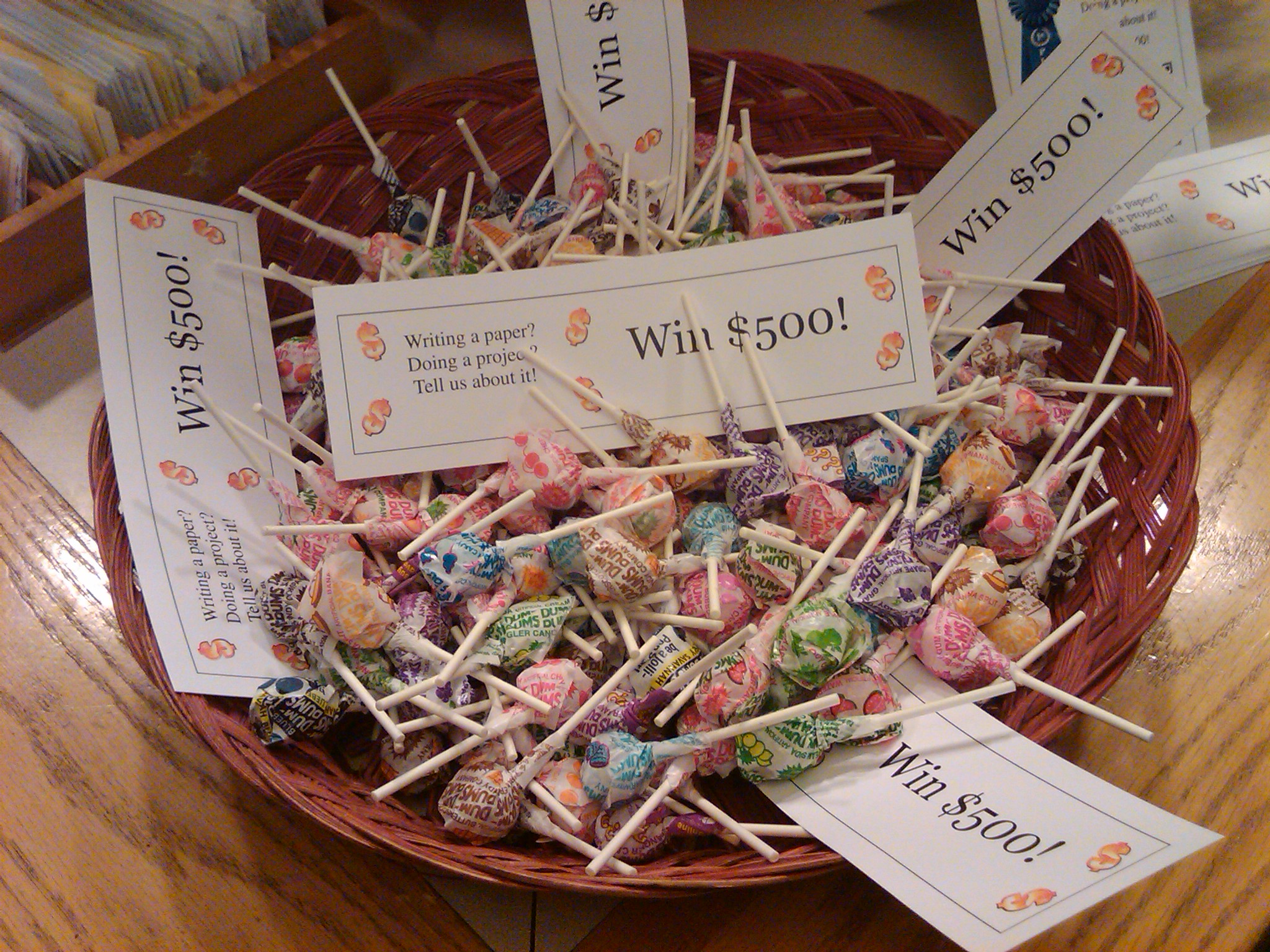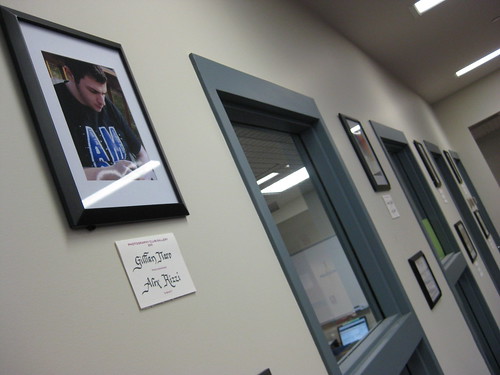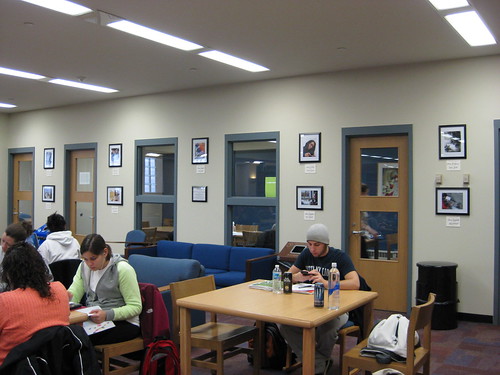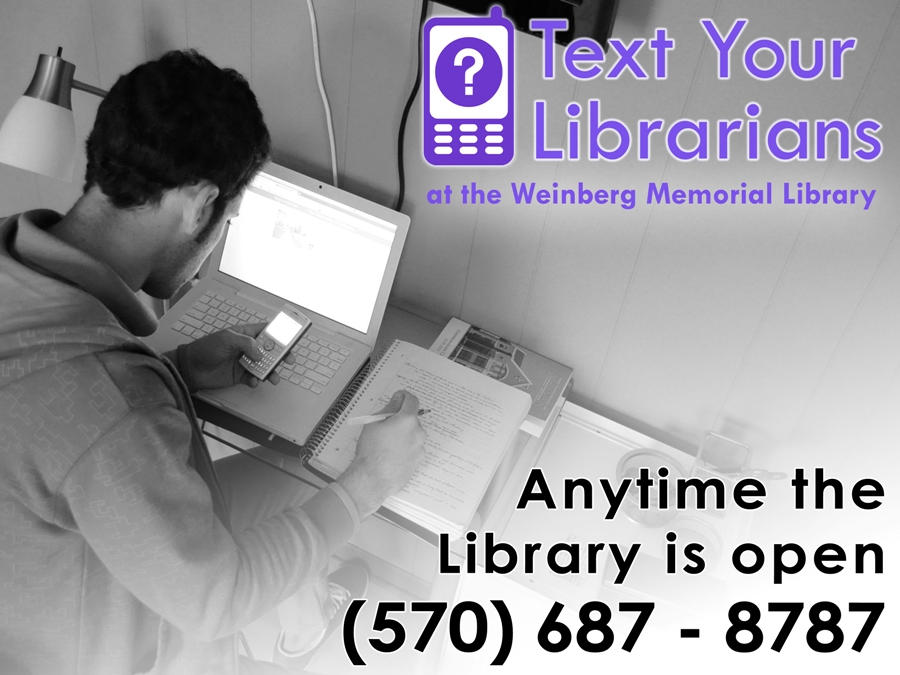Congratulations to Carl A. O’Neil of Scranton, PA! Carl won a new computer, printer and computer courses from The University of Scranton, a gift basket from Medical Express Care and a $25 gift card from T.G.I. Friday’s.
CTLE Associate Director Granted American Citizenship
Congratulations to CTLE Associate Director Eugeniu Grigorescu who was awarded American Citizenship on Dec. 8th.
http://matrix.scranton.edu/news/royalnews/articles/2010/12/22/Eugeniu-Grigorescu.shtml
Welcome Father Quinn!
The Weinberg Memorial Library would like to welcome Kevin P. Quinn, SJ as the 25th President of The University of Scranton!
The Lollipops are Out!

We’ve all been studying very hard and doing a lot of work as the semester wraps up. Late night hours and lack of sleep can be very stressful, so why not enjoy a nice lollipop as you do your work? Our trusty librarian friends have supplied the students with lollipops at the reference desk for finals week. As you study all week, feel free to grab one!
Also, note the bookmarks advertising the library’s first annual Library Research Prize–a new program where you could win $500 for the research you are already doing for your classes. Click on the link for details on how to enter.
And remember, we’re open until 2 am tonight, tomorrow, Wednesday and Thursday this week. Happy studying!
Your Library Account
Attention Students:
Please return or renew your library materials before you leave for the Holiday Break. Library materials left behind in your dorms will become delinquent over the break if forgotten and you will return to some hefty fines.
If you need to bring items home with you over the break, just let us know that so that we can adjust your due dates.
You may contact the Circulation Desk at 570-941-7524.
Thank you and have a great Holiday!
Clarks Summit Celebrates 100 Years
Clarks Summit is turning 100 and will be celebrating its centennial all throughout the 2011 year, beginning in January. The Abington Journal featured an article last week by Joan Mead-Matsui about the event, describing some of the activities that are planned to take place throughout the year, including a kickoff 10 a.m. January 15th and a Christmas tree bonfire later that day.
The official birthday of the Borough is August 30th, 2011, and will include a weekend of special activities August 26 to 28.
Two of the library’s staff, Barb Evans of Circulation/Access Services and Annette Barosi Kalwaytis of Special Collections/University Archives, are even part of the planning committee, as is a former U of Scranton professor, Vice Chair Dennis Martin.
Annette Barosi Kalwaytis, Sponsor Chair, discusses their work in the article: “We sent more than 600 letters to various businesses and individuals, asking for support and we’ve had a response to our mailing. But in order for us to do what the committee has proposed for the centennial, we will need the support of the community. In my mind, I’m looking at one large birthday party. There is no age barrier to this centennial and we want everyone to have a great time.”
For more information about the event or to read the full article check out The Abington Journal
Extended Library Hours for Finals 2010
Extended Hours
Wednesday-Thursday, December 1-2………….8:00a.m.- Midnight
Friday, December 3…………8:00a.m- 10:00p.m.
Saturday, December 4…………9:00 a.m.- 9:00p.m.
Sunday, December 5…………Noon – Midnight
Monday-Thursday, December 6-9………..7:00a.m.- 2:00a.m.
Friday, December 10…………8:00a.m.- Midnight
Saturday, December 11………..8:00a.m.- 5:00p.m.
Sunday, December 12…………Closed
Library Research Prize
Do you want to win $500? Are you doing a research project for one of your courses here at The University of Scranton? Are you an undergraduate student?
If you answered yes to all three of those questions, then you should submit an application for the Weinberg Memorial Library’s Library Research Prize. The prize is a new initiative by the library designed to recognize excellence in research projects that show evidence of significant knowledge in the methods of research and the information gathering process, and use of library resources, tools and services.
Your research project must be one that you completed for a credit bearing course that you took (or will take) at The University of Scranton during the following semesters:
Summer 2010, Fall 2010, Intersession 2011, or Spring 2011
For more information: www.scranton.edu/libraryresearchprize




 Student photographs, like this one by James Benfante, will be used to market the Library’s text messaging reference service
Student photographs, like this one by James Benfante, will be used to market the Library’s text messaging reference service

